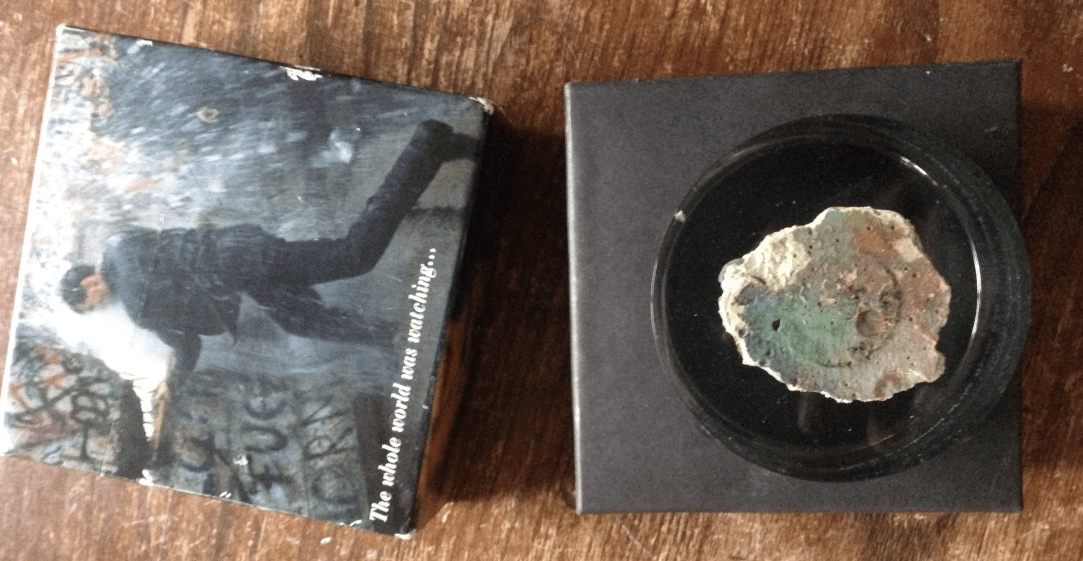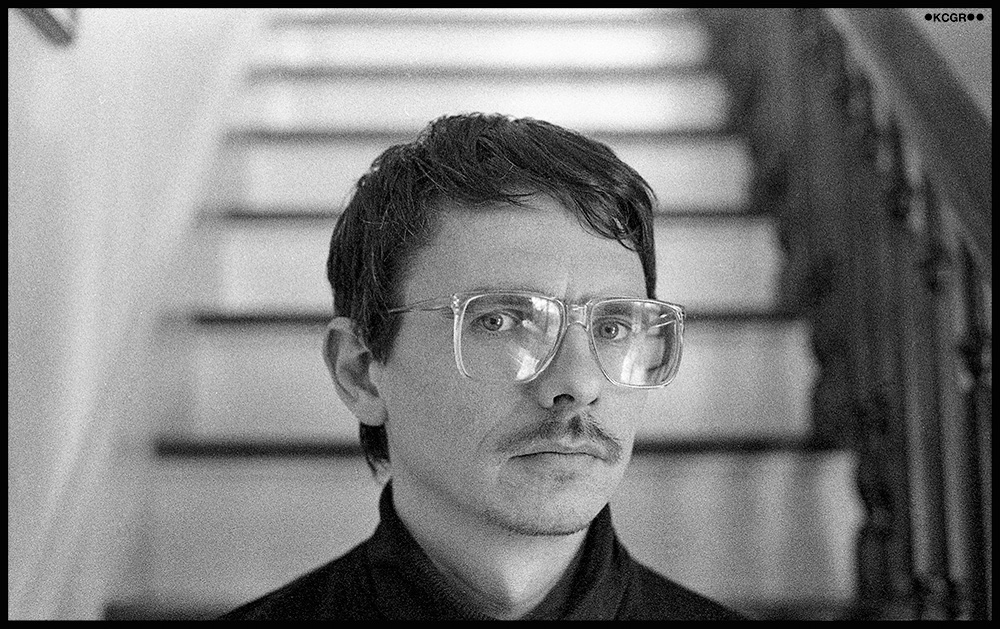Українська реклама
Наша сусідка у Штатах, філіпіно-польського походження, принесла ще якось давніше показати нам шматок Берлінської стіни, залитий у склі, коробка в стилі 80-их. На Ґданській корабельні, stoczni, де розпочався рух «Солідарність» серед сувенірів – копія кумедної ручки з портретом Івана Павла ІІ, якою Лех Валенса підписував Ґданські угоди з урядом ПРЛ. Важливо будь-якому народу не дозволити писати історію замість себе, зітерти себе з історії – читай – з поверхні землі.
Антиукраїнська риторика – реклама для антиколоніальної, антиімперської, демократичної, тепер ще і передової на глобальному фронті України. Я пам’ятаю, де був, коли читав або чув неочікувані новини про війну, і в даний момент інформація змінює сприйняття та розуміння історії, робить неможливими здійснення того, що було запланованим та узгодженим. Загроза була наче і тут, а укриттям – дитсадок, що названий віршем Шимборської, або Молочний бар, Bar młeczny, типово польська їдальня, кулінарно близька до Західної України. Польська реклама – наче натуралізм у повороті історії культури, власне тут проявленої духовно.
У медіях: прогнози і аналітика, наче про погоду або клімат, і тепер, коли кожен в Україні потерпає взимку від нестачі енергії і тепла, допомога надається не лише для забезпечення споживчими продуктами як у перші місяці, потрібне забезпечення живленням, для зв’язку принаймні. Генератори з сонячними батареями чекають, щоб бути доставлені в Україну. Друзі допомагають усувати і прибирати розвалини у вихідні дні, як частина вже масового волонтерського руху. Україну відбудують і недавно за один тиждень відбулось три окремі дискусії архітекторів.
«(…) треба дати свідчення (…) – оглядаєш своє блазнівське обличчя (…) мене викликали – , чи ж не було кращих», – пише польський поет Герберт у циклі віршів про пана Коґіто. Пан Коґіто у Герберта – це карикатура на сучасного громадянина, свідка злочинів, поборника і захисника, наче обізнаного, але водночас зманіпульованого медіями та суспільством.
Тимчасова домівка в Варшаві, так наче мусить стати постійним домом, переїзди і подорожі, на довго і на коротко: з часом можливо освоїтись тут у Польщі, яку знав спочатку з розповідей, телебачення або підручників, і досі тут транслюють новини в «Телеекспресі» о 5-тій, як тоді за українським часом о 6-тій, і ті ж «Смерфи», що у 90-ті. Подорож на край Європи – це відкриття ще однієї мови.
Ukrainische Werbung
Die Nachbarin in den Staaten, mit philippinisch-polnischem Hintergrund, zeigte irgendwann einmal ein Stück der Berliner Mauer, eingelassen in Glas, in einer Schachtel im Stil der 80er. In der Gdańsker Werft, in der die Solidarność-Bewegung begann, befindet sich unter den Souvenirs die Kopie des lustigen Kugelschreibers mit dem Portrait Johannes Paul II, mit dem Lech Wałęsa das Augustabkommen mit Volkspolen unterschrieben hat. Jedem Volk ist es wichtig, nicht zuzulassen, dass seine Geschichte anstatt ihm selbst geschrieben wird, es nicht ausgelöscht wird, sprich – von der Erdoberfläche getilgt wird. Antiukrainische Rhetorik ist Werbung für eine antikoloniale, antiimperiale, demokratische und nun auch an vorderster globaler Front stehende Ukraine. Ich weiß noch wo ich war, als ich die unerwarteten Nachrichten vom Krieg gelesen oder gehört habe, und in diesem Augenblick verändert Information die Wahrnehmung und das Verständnis von Geschichte, und machte es unmöglich, Geplantes und Vereinbartes zu realisieren. Es schien, als lauere Gefahr auch hier. Der Kindergarten, der nach einem Gedicht von Wisława Szymborska benannt ist und die Bar młeczny, die typische polnische Kantine, die kulinarisch an die Westukraine erinnert, wurden zu Luftschutzraum. Polnische Werbung ist wie Naturalismus einer Geschichtswende der Kultur, die vor allem hier spirituell in Erscheinung trat. In den Medien sind es die Vorhersagen und Analysen, wie Wetter- oder Klimaberichte, und jetzt, wo jeder in der Ukraine an der Energieknappheit leidet, wird nicht nur bei der Versorgung mit Konsumgütern geholfen, sondern in erster Linie bei der Stromversorgung, vor allem für die Kommunikation. Solargeneratoren warten darauf, in die Ukraine geliefert zu werden. Freunde helfen an Wochenenden beim Aufräumen und Beseitigen der Trümmer, als Teil einer schon großen Freiwilligenbewegung. Die Ukraine wird wieder aufgebaut und vor kurzem fanden innerhalb einer Woche drei verschiedene Diskussionsrunden von Architekten (…) es gilt Zeugnis abzulegen (…) betrachte dein Narrengesicht im Spiegel / und wiederhole: ich wurde berufen— gab’s denn nicht bessere” — das schreibt der polnische Dichter Zbigniew Herbert in seinem Gedichtband über Pan Cogito. Herberts Pan Cogito ist die Karikatur eines heutigen Bürgers, eines Zeugens von Verbrechen, eines Verfechters und Verteidigers, zwar eines kundigen, aber gleichzeitig eines von den Medien und der Gesellschaft manipulierten. Das vorübergehende Heim in Warschau ist, als ob es ein ständiges Zuhause wird, nach Umzügen und Reisen, längeren wie kürzeren: mit der Zeit ist es möglich, sich hier in Polen niederzulassen. Das Polen, das ich zunächst aus Erzählungen, dem Fernsehen und Schulbüchern kannte, wo noch immer die Teleexpress-Nachrichten um 17 Uhr ausgestrahlt werden, was 18 Uhr nach ukrainischer Zeit ist, oder die “Schlümpfe” wie in den 90ern. An den Rand Europas zu reisen bedeutet, eine weitere Sprache zu entdecken.
Übersetzung: Lukas Joura
A Ukrainian Ad
A while ago, our Filipino-Polish neighbor in the States showed us a piece of the Berlin Wall ensconced in glass in a box that looked like it was from the 80s. Among the souvenirs available at the Gdańsk Shipyard where the Solidarity movement started is a replica of the funny John Paul II pen that Lech Wałęsa used to sign the Gdansk Agreement with the Polish People’s Republic. It’s important that no nation let others write its history, to wipe it from history—read—from the face of the earth.
Anti-Ukrainian rhetoric is actually an advertisement for an anticolonial, anti-imperial, democratic—and now leading on the global front—Ukraine. I remember where I’ve been each time I read or heard some unexpected news about the war. Right now information changes our perception and understanding of history, makes impossible the realization of what was planned and agreed on. The threat was felt here in Poland too, and the shelter, a daycare named after a Wisława Szymborska poem or a typical Polish milk bar whose cuisine is very close to Western Ukraine’s. Polish ads are like the naturalism in the turn of cultural history that was here developed spiritually in particular.
There are forecasts and analyses in the media, as though this were about the weather or climate. Now, when everyone in Ukraine is suffering through a winter with little heat and electricity, help comes not only in the form of food, as it was in the first months. It is also necessary to provide power, if only for communication. Solar-powered generators await delivery to Ukraine. Friends help people remove and clean up debris on weekends as part of a massive volunteer movement. Ukraine will be rebuilt; recently there were three separate discussions among architects in one week.
“You must give testimony . . . examine your fool’s face in the mirror / repeat: I was called—was there no one better than I,”[1] writes the Polish poet Zbigniew Herbert in his cycle of poems about Mr. Cogito. Mr. Cogito is a caricature of a contemporary citizen, a witness to crimes, an advocate and defender who seems to be informed, but simultaneously manipulated by the media and society.
A temporary home in Warsaw, that seems it must become a permanent one, moving and traveling, long and short: in time, perhaps, I’ll feel at home here in Poland, a place I first knew from stories, TV, and textbooks. The Teleexpress news still comes on at 5 o’clock here, whereas I watched it at 6 in Ukraine; they show the same Smurfs from the 90s. A journey to the edge of Europe is the discovery of yet another language.
Translation: Ali Kinsella
[1] “The Envoy of Mr. Cogito” by Zbigniew Herbert, translation by Alissa Valles, https://poems.com/poem/the-envoy-of-mr-cogito/
Teilen












